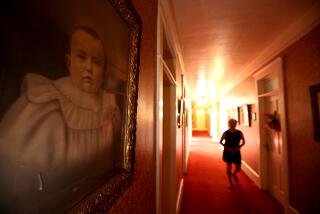Raging Competition : Niagara Falls Tourist Business Hit by Violence
- Share via
NIAGARA FALLS, N.Y. — This vacation spot, famous as a romantic honeymoon hideaway, has become a tourist industry battleground of firebombings, torched information booths and patrolling guard dogs.
Niagara Falls draws 10 million people a year to gaze at its thundering waterfalls, generating a tourism payroll of $55.5 million.
Now, competition among operators of sightseeing tours, information booths and hotels and motels has produced a series of violent incidents. No one has been arrested or injured, but passers-by have been endangered, property damaged and security increased.
“I hope it’s behind us, because that sure is bad publicity for Niagara Falls,” said David J. Fleck Jr., president of the Niagara Falls Hotel and Motel Assn. “This isn’t Beirut. It’s America.”
Booth Firebombed
On July 16, an information booth in North East, Pa., run by Bridal Veil Tours of Niagara Falls, was firebombed. Two women standing outside were shielded from the blast by a concrete wall.
The next day, a pipe bomb ripped open a Niagara Falls information booth run by Gavin Tours.
In July, 1985, a firebomb caused $16,000 in damage at a Niagara Falls tourist booth owned by Eugene Guido, a motel and restaurant owner who is considered the city’s biggest sightseeing tour operator.
The violence apparently is rooted in the intense competition among tour operators and in the struggle between hotels downtown near the falls and motels uptown, a less attractive location.
One result of the competition is potential confusion for tourists, who are left to their own devices once they enter the city limits. For one thing, there’s no “This way to the falls” sign for visitors.
One Official Stand
As they come into town, they encounter only one official information booth, operated by the Niagara Falls Convention and Visitors Bureau. The rest are official-looking stands actually run by privately owned sightseeing companies with ties to certain hotels or motels.
Guido said his company gets $5 for each room it books with a hotel or motel.
Though he has business interests uptown and downtown, Guido opposes signs to the falls.
“Show me a tourist among the hundreds of millions of visitors in history who have come here and went home without finding the falls,” he said. “I still feel very strongly that tourists should be left alone once they get to the city limits. Let the best man win once they get into the city.”
On the other hand, Mayor Michael O’Laughlin said: “I’ve tried for 11 years to get a sign directing tourists to the falls. I have not been able to get a sign. There are some who feel you shouldn’t tell (tourists) where the falls are, let them wander around, buy some gas, buy some food. Let them get mad.”
Misinformation Problem
Fleck, who runs the downtown Howard Johnson’s Motor Lodge, says misinformation is sometimes given at the booths.
“They’ll tell them the hotels are all filled. Or, ‘This is a bad one, go to this one.’ Or they’ll show them a picture of traffic jams in downtown Niagara Falls,” he said.
The tourists, he said, later discover that what they have been told isn’t necessarily true.
“They’re gonna go back to their hometown and say, ‘Hey! Niagara Falls, N.Y., is a rip-off. They just ripped us off, so go to Canada,’ ” Fleck said.
Despite their differences, Guido and Fleck see Canada as their main rival in the struggle to get tourist business.
Guido said the first thing tourists ask is, “Where’s Canada?”--a 30-second drive across the Rainbow Bridge.
“No. 1, we have to talk people out of Canada,” said Guido. “No. 2, we have to book them a room, and No. 3, we sell them a tour if we can.”
Canadian Expenditures
Ontario, Guido said, spends $30 million a year for tourism and gets $22 million a year to maintain the park on the Canadian side of the falls.
The New York state Commerce Department’s entire tourism budget is $14.8 million, and the Parks Commission, as of 1985, had a $4.4-million budget for seven state parks, including the one at the falls, Guido said.
Compromise appeared possible as this summer drew to a close.
Fleck said Guido has agreed to alter the signs on his main sightseeing booth to make them look less official.
“We don’t need a policeman or a law passed to find compromises,” Guido said. “Intelligent business people can sit down and try to work things out, even if they’re competitors.”
More to Read
Sign up for The Wild
We’ll help you find the best places to hike, bike and run, as well as the perfect silent spots for meditation and yoga.
You may occasionally receive promotional content from the Los Angeles Times.






